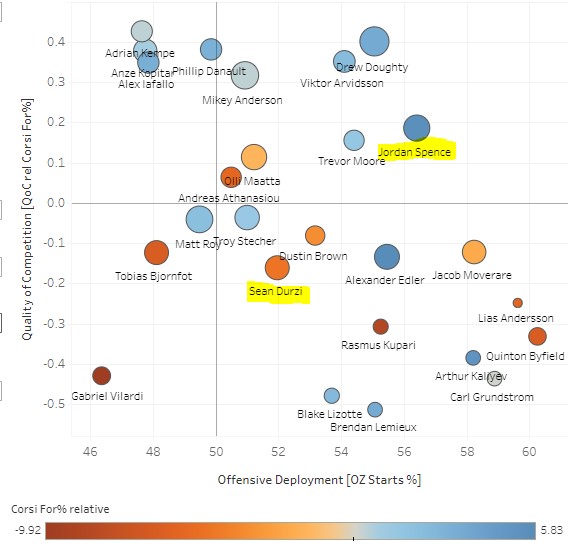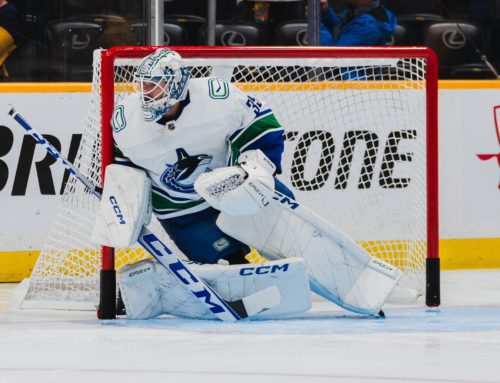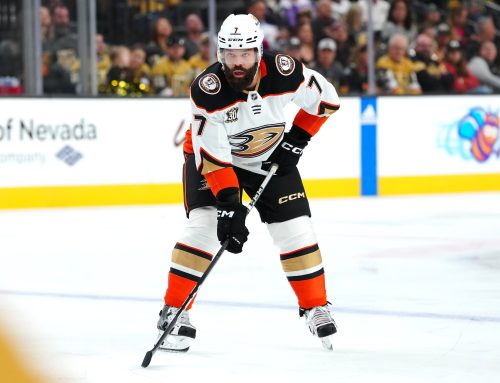The Fantasy Prospects Report was released on June 14! If you didn't pick it up, you can do so here. If you downloaded it on the 14th, please note that I did make a small update that included one added profile and several fixed typos (including a small fix in the Top 50 consensus chart, which had a player in there twice with different spellings).
And now I turn my attention to the Fantasy Hockey Guide. Yes, "the Bible" of fantasy hockey. Not a lot I can do without knowing the rosters yet, but there is still some work that can be done in terms of preparation and analyzing the team analytics from last year.
Unrestricted Free Agency opens July 13 and the NHL Entry Draft is July 7.
*
I was looking at some players last week, as I tend to do pretty often (as you do too – you know all about what I'm saying!), I lost myself a little bit inside the Frozen Tools rabbit hole. I was in the Player Compare section, looking at Sean Durzi vs. Jordan Spence. Both are available players in my deep dynasty league (15 teams, 35+ players per team). Both will be drafted I'm sure in the first three rounds, possibly even the first two. I have a lot of picks in the first two rounds and would consider taking one if he fell far enough and I had everybody else I wanted. But if I had my choice of either one – who would I take?
Durzi was drafted higher, is a little older/more established, has impressive PP production (14 PPPts), loves to shoot the puck, sees more PP time and is a big part of the power play (PP IPP of 87.5%) when he's out there. Spence has better Corsi/Fenwick numbers and a higher Offensive Zone Start%. Both players had ridiculous junior numbers and in their final AHL seasons Durzi had 16 points in 13 games while Spence had 42 in 46. All of this information was already at our fingertips in the player profiles we have over at Frozen Tools.
So which one would be the safer pick? Which one has higher upside? Upside seems like a wash. Durzi seems a little safer. Scrolling further down the Compare Players page, there was an ice time chart that, while it looked fancy, really didn't add anything. How would a Player Usage Chart look using just those two players? Well, I went to the PUC section and took a look. Here is what I found:

Wow! Huge difference. Spence sees more offensive zone starts, but he's also seeing tougher competition. He's driving (relative) possession really well, while Durzi's possession isn't nearly as good. This settles it for me.
When looking at this chart with just two players however, keep in mind that it exaggerates the differences. By a lot. Look at the bubble size. At a glance, it looks like Spence sees triple the ES ice time as Durzi. Not so. He sees about one shift per game more – so it exaggerated that stat. To really see how much this chart stresses the points of difference between two players, let's look at them on the full Los Angeles chart:

Here, the bubble sizes are closer, Durzi isn't seeing quite as much sheltered minutes, and Spence isn't dominating possession by quite the amount he was in the other chart. Because the scaling has changed. So when you look at the PUC with just two players, keep that in mind. It takes the subtle differences between the two players, and shines a spotlight on them. It applies a magnifying glass. So while it told me that, hey – Spence has been player better hockey, creating more offensively while not hurting as much defensively, I also need to remember that it's giving an exaggerated picture. And for something like this, I think it's actually quite helpful.
So, long story short, we removed the ice time chart from the player compare page – and added the PUC (Player Usage Chart) for just those two players. And now a pretty great tool just became 10 times better.
*
I posted this figuring I would get eight or 10 good ideas and then dig deep on four or five them. Because it was Father's Day, my time was a little tight. But I had over 50 players listed amongst 40+ replies. I'll tackle a few today, but will dedicate next week's Ramblings entirely to this, I'll tweet out the question again and hopefully be able to go through them all.
Jakub Vrana – Vrana was enjoying a breakout season that saw him about to hit 30 goals and 62 points before COVID cut him off at 69 games back in 2020-21. He was traded to Detroit over a year ago, but spent most of that time out with a shoulder injury that required surgery. In 37 games with the Red Wings he has 21 goals and 30 points (seven on the power play). Before his surgery, he briefly showed chemistry with Filip Zadina, but the two never really got going this year. How he does moving forward depends greatly on who Detroit's next coach will be. They also need a scoring centerman – Pius Suter doesn't cut it. Zadina on the other wing is fine, but he's a shooter too. I just don't see a line clicking with two shoot-first guys and a mediocre pivot.
Put Jonatan Berggren, an elite set-up man, on that line and Vrana could really take off. But again, the Wings need a center too. Evgeni Malkin, Claude Giroux and Nazem Kadri would make the biggest impact and would take Vrana from being a 62-point player to pushing well into the 70s. Because a 62-point player is what he is. He was on pace for that in his breakout year, and he's been almost exactly on that pace since then. I think the line of Tyler Bertuzzi, Dylan Larkin and Lucas Raymond remains intact, so Vrana gets the leftovers. In this case, Vrana owners better hope those leftovers include one of the above free agents at center, and prospect Berggren on the other wing.
*
Anthony Mantha – The guy who was traded for Vrana, how fitting. But I like this suggestion because he hasn't actually done anything yet. The guy will be 28 in the fall and he's never had 49 points in a season. But, when we're talking about forwards who are 6-5, drafted in the first round and tore it up at other levels, I'm never surprised if they surge at this age. And – take a look – his career games played is 353. That's just 47 away from his Breakout Threshold.
First of all, I don't believe he stays healthy. I think an expectation of 70 games is generous, but let's go with that. I can see him posting 30 points in the first 50 games, and then 20 in his last 20, giving him his first 50-point season. Injuries have likely eroded his longer-term upside, so I doubt we see him ever reach 70. But I think he can get close. It would come down to how many games can he string together. I consider him a cautious 'buy' with lowered expectations. He'll set a career high this year, but probably only barely.
*
Tanner Jeannot – I'm always hesitant to put a cap on a player who has overachieved the way Jeannot has. He was a mediocre scorer in junior who, as over-agers do, really blossomed in the WHL as a 20-year-old who was eligible to play in the AHL but chose not to. At first, he transitioned poorly to pro hockey, splitting time between the AHL and ECHL. But in 2020-21 he really took off. And when the Predators called him up they had trouble sending him back down. And now this season he scored 24 goals, added 130 PIM and 318 Hits. That's incredible roto-league value. His S% was 14.5% in his final WHL season, was 15.1% in the AHL, and over 26% in the eight ECHL games that he played. So while his 19.7% in his NHL career is concerning, it's not too much out of whack. I think his numbers are sustainable. I just don't see the upside for too much more. I figure he will up his shot volume, but balance that with his S% slipping to 15% or 16%, his goal totals should hover around mid- or low-20s. With better linemates, he could bump his assists and reach 50 points. But as long as he's alongside Colton Sissons and Yakov Trenin, he's probably not getting there. And why would the Preds break up that trio? They had 700 Hits last season between them (697 to be exact).
*
Rem Pitlick – Pitlick is the very definition of a boom-or-bust player. Too good for the AHL, and is still fighting to show the NHL that he's good enough for the top six there. His possession numbers are crap, his defense is suspect and he has no consistency. But under Martin St. Louis he saw increased ice time and pretty good production. His next contract will be key. He's actually an unrestricted free agent so where he signs, and for how much, will really tell us a lot. If he gets something close to $2 million and it's a multi-year deal (doubtful), then he's probably got a pretty good chance. If not, then the fight will continue. Much will depend on the coach and the depth chart. I wouldn't draft him, but he's the type of player who will be scratched or buried early on…and then really blossom if an injury strikes his team's top six.
*
Jesper Bratt – I was asked if I thought his point-per-game pace was a one-off. No it was not. Bratt is the real deal and to me he is the key to what finally got Jack Hughes going. Every line Bratt was placed on got a jump start. He made Andreas Johnsson a first-quarter star (don't forget Johnsson led the Devils in scoring early on) and Dawson Mercer and early Calder candidate. Everything Bratt touches is gold. And no, the Devils will not trade him. I do think Bratt is an injury risk. He just played 76 games but unless I see that again I consider him a 70-game (or low 70s) player. But at close to a point-per game I think high-60s is a done deal. And if he can play 80 games, then topping last year's number will be a near-certainty. I'll go one further – if Hughes can also stay healthy, then Bratt will clear 80.
For what it's worth, last season was Bratt's BT season.
*
CUP Notes: Teams that hold a 2-0 series lead in a best-of-seven Stanley Cup Final go on to win the championship 90% of the time (47-5). The five teams to rally to claim the title were the 2011 Bruins (4-3 W vs. VAN), 2009 Penguins (4-3 W vs. DET), 1971 Canadiens (4-3 W vs. CHI), 1966 Canadiens (4-2 W vs. DET) and 1942 Maple Leafs (4-3 W vs. DET).
The Avalanche became the first team in 37 years with four seven-goal outings in a single postseason.
Cale Makar scored twice in the third period to become the second defenseman in NHL history to score both a shorthanded and power-play goal in a Stanley Cup Final game. The only other instance came in the May 24 suspended game during the 1988 Final when Bruins defenseman Glen Wesley – a rookie at the time – did so, with both goals coming in the second period just before the game was called due to a power failure at Boston Garden.
Colorado has scored 76 goals in 16 games this postseason (4.75 G/GP), including 12 contests with four or more tallies. Their goals-per-game rate currently ranks fifth in Stanley Cup Playoffs history among clubs that played at least 16 games.
Since 1987 when all rounds became best-of-seven, only one team has finished a postseason with fewer than four losses: the 1988 Oilers, who went 16-2 plus their no-decision in the suspended game during the Final (which was tied 3-3 when called), en route to their fourth championship in five years. The Avs are 14-2.
*
See you next Monday.





 FLA
FLA CHI
CHI NYR
NYR PIT
PIT L.A
L.A COL
COL CAR
CAR MIN
MIN VGK
VGK N.J
N.J CBJ
CBJ BOS
BOS

